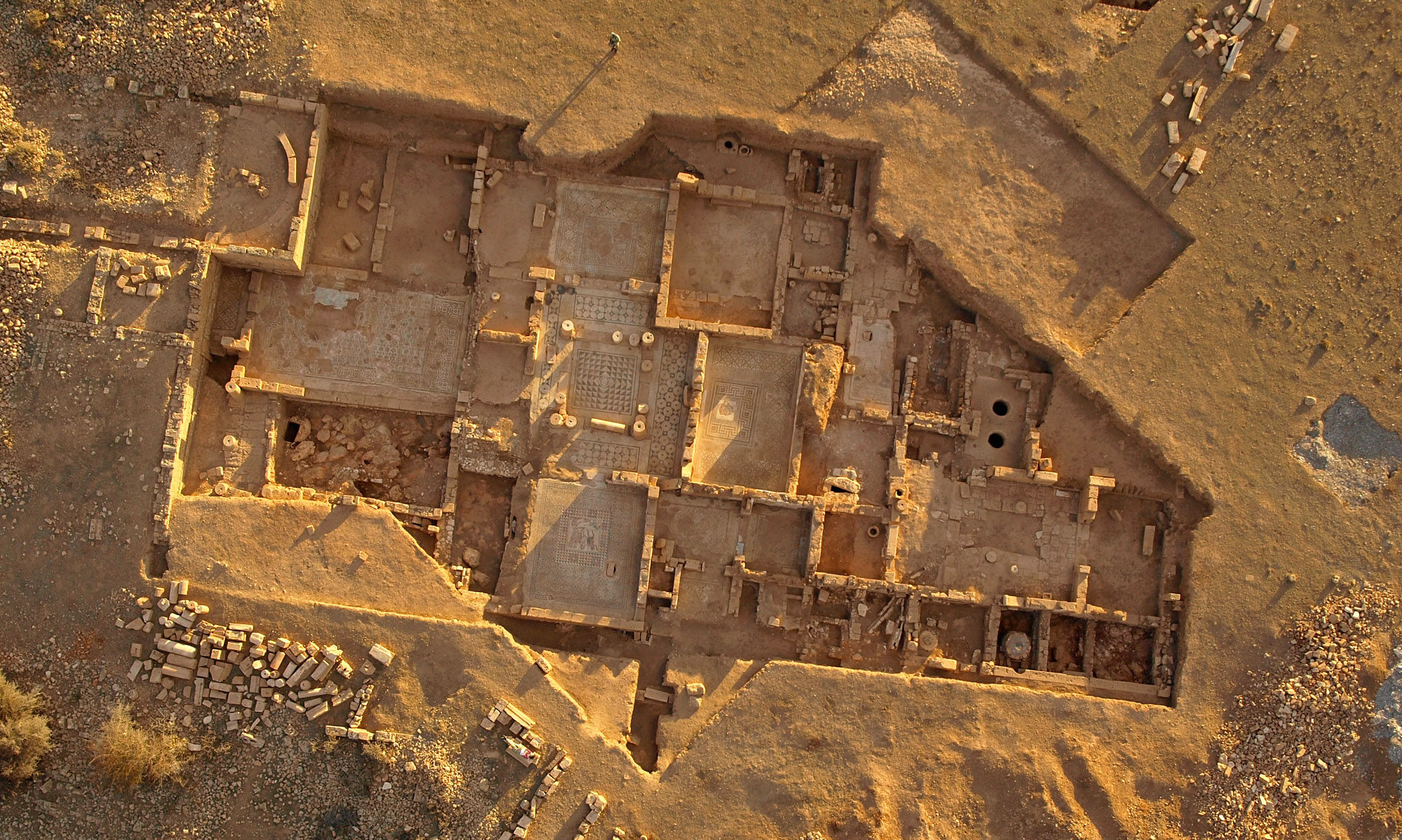Overview
The study programme extensively covers new trends in archaeological research and discusses archaeology’s social function. Our course focuses mostly on Mediterranean archaeology and providing students with the elementary knowledge and practical skills that will enable them to participate in excavations anywhere around the world.
The programme includes a wide range of courses on general topics in archaeology, as well as in-depth courses on prehistoric and ancient societies of the Near East, Egypt, Greece, Rome, the Roman Provinces and the Americas. Simultaneously, our course focuses on practical aspects; excavation methods, field documentation, data acquisition and processing techniques, all indispensable in modern academic practice, or museology, which prepares students for exhibition organisation and cooperation with cultural institutions.
A significant element within the programme is field training: field walking survey and excavation seasons. The excavations are conducted by researchers affiliated with the Faculty of Archaeology at the University of Warsaw, in Poland or abroad – in Egypt, Georgia, Armenia, Uzbekistan, Bulgaria, Italy, South America and many more locations.
During their studies, students acquire specialist knowledge in archaeology enabling their active participation in excavations at sites of diverse character – reading and documenting stratigraphy, handling measuring devices, preparing research or museum catalogue entries, searching archives, performing scholarly analyses and drawing conservation records, as well as realising exhibitions.
Professional and general knowledge developed in the course of their studies, as well as competencies in individual work and cooperation within a team, form a strong base for further studies at the second-cycle level in archaeology and other fields.
Programme
BA started in academic year: 2025/2026 (new programme)
Printable version of programme: BA started in academic year 2025/2026
Why do we not provide credit methods and syllabi in the tables?
The detailed requirements vary between instructors and change rapidly. You will always find them in the current USOS card. Here, we outline the key factors to consider when planning your registration: title, course type, number of hours, and ECTS credits.
1st year
1058 h (including 300 h of field training) • 60 ECTS
| Course | type of course | hours | ECTS |
| Introduction to Archaeology | lecture | 60 h | 4 |
| Archaeological Excavation Methods and Surveying | seminar | 30 h | 3 |
| Archaeological Documentation Methods | seminar | 30 h | 3 |
| Introduction to Archaeological Specializations
• Archaeology of Ancient Egypt and Nubia • Archaeology of the Ancient Near East • Archaeology of Ancient Greece • Archaeology of Rome and Roman Provinces • Prehistoric Archaeology and Middle Ages • Archaeology of the Ancient Americas and Far East • Bioarchaeology and Environmental Archaeology |
7 × lecture | 7 × 60 h | 7 × 4 |
| Drawing of Artefacts | class | 30 h | 4 |
| Scientific Workshop | seminar | 30 h | 3 |
| Modern Language | class | 120 h | 4 |
| Intellectual Property Protection | internet course | 4 h | 0.5 |
| Occupational Health and Safety | lecture | 4 h | 0.5 |
| Field training (long) 1 | field training | 150 h | 5 |
| Field training (long) 2 | field training | 150 h | 5 |
| Sport | class | 30 h | 0 |
| SUM | 1058 h | 60 |
2nd year
≥ 690 h (150 h field training) • 60 ECTS
| Course | type of course | hours | ECTS |
| Specialization courses I* | acc. to the offer | ≥ 90 h | 10 |
| Introduction to Methodology | seminar | 30 h | 3 |
| Elective courses – BA level | acc. to the offer | ≥ 90 h | 12 |
| Laboratories in Ancient Technologies
• Ancient Technology: Stone • Ancient Technology: Pottery and Glass • Ancient Technology: Metal • Ancient Technology: Organic Materials |
4 × lab | 4 × 30 h | 4 × 4 |
| Photography of Artefacts | class | 30 h | 4 |
| Selected General University Courses OGUN | acc. to the offer | ≥ 30 h | 4 |
| Modern Language | class | 120 h | 4 |
| Modern Language EXAM | — | — | 2 |
| Field training (long) 3 | field training | 150 h | 5 |
| Sport | class | 30 h | 0 |
| SUM | ≥ 690 h | 60 |
3rd year
≥ 720 h (30 h field training) • 60 ECTS
| Course | type of course | hours | ECTS |
| Introduction to Bachelor Thesis Workshop | seminar | 30 h | 3 |
| Tutored Bachelor Thesis Workshop | class | 30 h | 4 |
| Independent Bachelor Thesis Workshop | class | 240 h | 8 |
| Specialization courses II | acc. to the offer | ≥ 90 h | 10 |
| Elective courses – BA level | acc. to the offer | ≥ 90 h | 12 |
| Museology, Conservation and Popularisation of Archaeology | seminar | 30 h | 3 |
| Basic Digital Methods in Archaeology | class | 60 h | 8 |
| Ancient Language – Latin or Greek | class | 60 h | 6 |
| Selected General University Courses OGUN – social sciences | acc. to the offer | ≥ 30 h | 5 |
| Sport | class | 30 h | 0 |
| Field training (short) date of choice
• Autumn: 2nd half of October • Spring: March |
field training | 30 h | 1 |
| SUM | ≥ 720 h | 60 |
How to use the tables?
You arrange the plan in USOS – hours and ECTS show how to distribute the load evenly.
You book field training places – plan the long blocks (150 h) in advance; short exercises take place in March and October.
You combine specialisations – from the second year, you choose your main path (major), and in the third year, you study an additional one (minor).
You can find the details – the forms of credit and the literature – in the syllabi; the course sheets in USOS.
Do you have questions? Take a look at the Studies tab or write to the Students’ Office – we’ll help dig up the right solution!
BA started in academic years: 2019/2020, 2020/2021, 2021/2022, 2022/2023, 2023/2024, 2024/2025
Printable version of programme: BA started in 2019-24
1st year
-
- Introduction to Archaeology – Lecture, 60 hrs (4 ECTS)
- Archaeology of Egypt and Nubia – Lecture, 60 hrs (4 ECTS) and obligatory classes, 60 hrs (5 ECTS)
- Archaeology of the Ancient Near East – Lecture, 60 hrs (4 ECTS) and obligatory classes, 60 hrs (5 ECTS)
- Outline of Prehistoric Archaeology – Lecture, 60 hrs (4 ECTS)
- Environmental Archaeology – Obligatory classes, 30 hrs (2 ECTS)
- Bioarchaeology – Obligatory classes, 30 hrs (2 ECTS)
- Archaeological Excavation Methods and Surveying – Obligatory classes, 60 hrs (4 ECTS)
- Techniques of Data Acquisition and Processing – Obligatory classes, 30 hrs (2 ECTS)
- OGUN (General University Courses) – Selected from the offer, 60 hrs (5 ECTS)
- Intellectual Property Protection – Obligatory classes, 4 hrs (0.5 ECTS)
- Occupational Health and Safety – Obligatory classes, 4 hrs (0.5 ECTS)
- Sport – 30 hrs (no ECTS)*
- Excavations – 300 hrs (18 ECTS)
Sum of ECTS: 60
* Please check the information provided here
2nd year
-
- Archaeology of Rome and the Roman Provinces – Lecture, 60 hrs (4 ECTS) and obligatory classes, 60 hrs (5 ECTS)
- Archaeology of Greece – Lecture, 60 hrs (4 ECTS) and obligatory classes, 60 hrs (5 ECTS)
- Outline of Archaeology of the Americas – Lecture, 60 hrs (4 ECTS)
- Museology, Conservation and Popularisation of Archaeology – Lecture, 60 hrs (4 ECTS)
- Ancient Technology: Stone, Pottery and Glass – Obligatory classes, 30 hrs (2 ECTS)
- Ancient Technology: Organic Materials – Obligatory classes, 30 hrs (2 ECTS)
- Archaeological Documentation Methods – Obligatory classes, 60 hrs (4 ECTS)
- Photography and Drawing of Artefacts – Obligatory classes, 60 hrs (4 ECTS)
- OGUN (General University Courses) – Selected from the offer, 60 hrs (5 ECTS)
- Ancient Language (Latin) – Obligatory classes, 60 hrs (4 ECTS)
- Modern Language– Classes, 120 hrs (4 ECTS)*
- Sport – 60 hrs (0 ECTS)**
- Excavations – 150 hrs (9 ECTS)
Sum of ECTS: 60
* Please check the information provided here
** Please check the information provided here
3rd year
-
- Proseminar I: Egypt and Near East – 60 hrs (6 ECTS)
- Proseminar II: Classical Archaeology – 60 hrs (6 ECTS)
- Optional classes – Classes selected from the offer, 3 x 30 hrs (3 x 3 ECTS)
- Introduction to Methodology – Obligatory conversatory, 30 hrs (3 ECTS)
- Scientific Workshop – Obligatory conversatory, 30 hrs (4 ECTS)
- OGUN (General University Courses), Selected from the offer, 60 hrs (5 ECTS)
- Ancient Language (Greek) – Seminar, 60 hrs (4 ECTS)
- Modern Language – 120 hrs (4 ECTS)*
- Modern Language EXAM – 0 hrs (2 ECTS)*
- Sport – 60 hrs (0 ECTS)**
- Fieldwalking surveys – 30 hrs (1 ECTS)
- BA thesis – (16 ECTS)
Sum of ECTS: 60
* Please check the information provided here
** Please check the information provided here
Before you start attending the classes, please check whether you submitted all necessary application documents to the Students’ Affairs Office. As soon as all these documents are submitted, you will be able to log in to the USOSweb system with the same login and password as the IRK (application) system:
Then you can choose the classes and lectures according to your programme and schedule. Please note that OGUN lectures must be paid for with tokens, which are visible on your account. For any questions concerning the USOSweb system, visit the Welcome Point on the Main Campus:
For any questions concerning the BA programme, please contact the Head of Archaeology (Studies in English), Dr. Katarzyna Pyżewicz wa.head.archeology@uw.edu.pl
Foreign students have a right to learn the Polish language for free.
Students of the first cycle (Bachelor’s degree) can get:
• 240 tokens for Polish language classes
• 180 tokens for lectures organized by Polonicum
• 2 tokens for a state certificate examination
http://polonicum.uw.edu.pl/en/courses-during-the-academic-year
http://polonicum.uw.edu.pl/en/state-certificate-examinations
For more details, please contact the Head of Archaeology (Studies in English), Dr hab. Katarzyna Pyżewicz wa.head.archeology@uw.edu.pl

